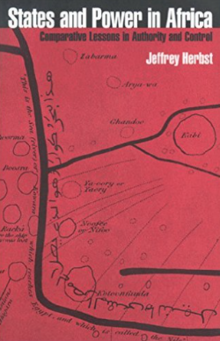States and Power in Africa: Comparative Lessons in Authority and Control
 |
|
| Author | Jeffrey Herbst |
|---|---|
| Country | United States |
| Language | English |
| Subject | State-building, Postcolonialism, Environmental determinism, Comparative politics, International relations, |
| Published | 2000 (Princeton University Press) |
| Media type | Hardcover, Paperback |
| Pages | 280 pages (paperback) |
| ISBN | (paperback) |
| LC Class | JQ1875.H47 2000 |
States and Power in Africa: Comparative Lessons in Authority and Control is a book on African state-building by Jeffrey Herbst, former Professor of Politics and International Affairs at Woodrow Wilson School of Public and International Affairs. The book was a co-winner of the 2001 Gregory Luebbert Book Award from the American Political Science Association in comparative politics. It was also a finalist for the 2001 Herskovits Prize awarded by the African Studies Association.
This book attempts to explain the lack of robust institutions and the prevalence of state failure in Africa. The work is heavily influenced by the scholarship of Charles Tilly and Max Weber. Both writers emphasize the role of war in the consolidation of state power over well-defined territories.
At the time of writing, Herbst argued that the political science literature had largely ignored the African state-building experience and focused instead on state creation in Western Europe. His book is an attempt to understand the long run processes of state-building in Africa.
In Europe, social scientists such as Charles Tilly have argued that European states consolidated power to survive in an anarchic international system during the fourteenth and fifteenth centuries. Faced with the constant threat of war, European political elites sent administrators and armed forces from the urban centers into rural hinterlands to raise taxes, recruit soldiers, and fortify buffer zones. Elites reduced the role of rural authorities and favored direct political rule. European states consequently developed strong political and economic linkages between cities and surrounding territories.
Herbst emphasizes that the international pressures for war-making that existed in medieval Europe never existed in many parts of Africa. The European state-building experience was unusual and exceptional because it occurred under systemic geographic pressures that favored state consolidation – namely, scarcity of land and high-population densities. By contrast, Herbst argues, Africa has for most of its history been a relatively sparsely populated continent. Precolonial African states never faced survival imperatives for the projection of state power over rural terrain.
...
Wikipedia
